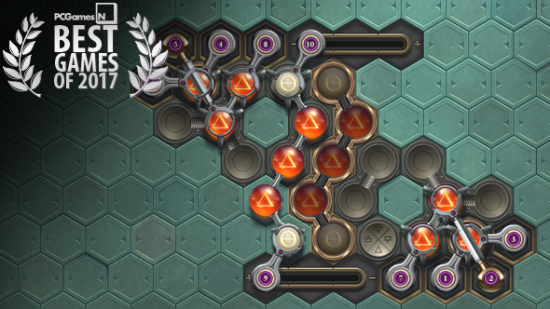Opus Magnum is the latest game from the makers of SpaceChem. If you are familiar with the developers’ work then you know what to expect: tough-as-hell engineering puzzles that you stick with for the wash of endorphins upon solving them.
Our Jordan Forward picked Call of Duty: WW2 as his game of the year.
This time around, you are charged with making alchemical machines that convert provided reagents into compounds of a different variety. That might mean stripping unwanted elements from a compound chain, or bonding them together to build something new – later levels ask that you do both, simultaneously.
I adore Zachtronic’s previous games, but Opus Magnum has its hooks in me deeper than any of them, and indeed any other PC game released this year. I have even been dreaming of machines that tear and knit together elemental compounds. It has a hold of me so tight because of its main loop; a dichotomy of function and malfunction.
When clockwork ticks it is a fascinating thing to watch: mechanisms of cogs, springs, and levers all moving in perfect synchrony, not a wasted action in sight. When it doesn’t work, however, it is deeply frustrating, as misaligned cogs halt each other, bringing the whole machine to a juddering standstill. It is like being in the vicinity of a dripping tap, a flickering light bulb, or a loose shutter batting in the wind – a grinding malfunction.
.gif)
Every puzzle of Opus Magnum requires you to build a machine of interlocking parts. For most of the game you and your contraption coincide in a state of malfunction. And it’s all your fault. The arms that pick up reagents are moving out of sync, overlap, and the machine breaks. Rather than two arms neatly passing an element, they both try to grab the same one and pull it in different directions at once, and the machine breaks. A revolver action cog is picking up elements faster than it can pass them off, becomes overloaded, and the machine breaks.
Most of my time in Opus Magnum is spent frustrated, staring at my mess of a machine, clumsily overlapping, breaking over and over as I make small adjustments. I fumble in hope that a small tweak is all that is needed to right the wrongs. However, this discomfort only enhances the satisfaction of watch my finished machine run in uninterrupted cycles.
Successes and failures are augmented because you have full ownership of your machine. Besides giving you the reagents and the product you must make, Opus Magnum’s puzzles are completely open. You aren’t finishing a half-built machine, there is no set solution you must unearth – you are given a set of parts in infinite supply and a clear workspace to assemble them as you wish. There are as many solutions to a puzzle as there are people playing the game. I have seen people make intricately aligned sets of sliding arms that move like a piston engine to solve puzzles I solved with meshed rotating arms.
This is a game that encourages you to stay with a puzzle even after you have a solution, tempting you to refine it, rebuild it with a contrivance that lets you use fewer parts than your friends. And so, by design, Opus Magnum is a game that pulls you into the mindset of trying to build your own opus magnum.
